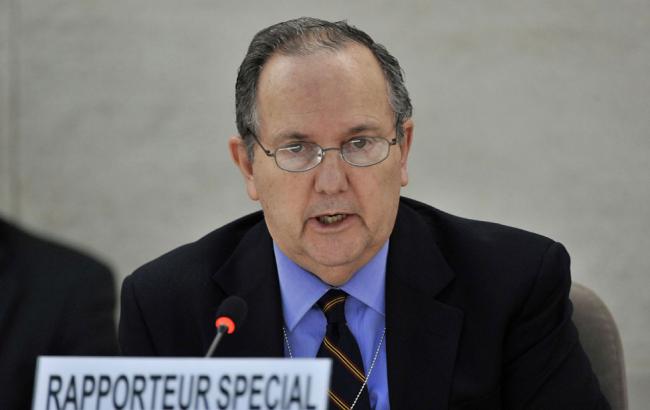
Despite progress, Georgia needs to do more, says UN expert dealing with torture
“The impact of measures adopted in this time period is visible and even quantifiable,” Juan E. Méndez said at the end of his official mission to the country, the first visit in ten years by an independent expert tasked by the UN Human Rights Council to monitor and report on the use of torture and other cruel or inhuman treatment or punishment.
“In less than three years, the Georgian authorities have managed not only to introduce extensive policy changes, but also to implement radical changes in the mentality of its staff throughout the entire chain of command,” he noted.
A news release issued by the UN human rights office (OHCHR) noted that Mendez “tried to include Abkhazia and South Ossetia, Georgia during his eight-day visit, but the respective de facto authorities there did not grant him access from Georgia.” However, he did visit both eastern and western Georgia, where he carried out unannounced calls to places of detention such as police stations, pre-trial facilities and penitentiaries.
“Through numerous testimonies, I found convincing evidence that the use of corporal punishment and forced confessions has been effectively abolished,” Méndez said, emphasizing that the Government “has done away with overcrowding and, in turn, with many of its detrimental consequences by significantly diminishing its prison population.”
Overall, the Special Rapporteur found acceptable cell conditions, adequate provision of food and medical care, and a reasonable access to phone calls with families. However, there was room for improvement in other areas.
“It strikes me that pre-trial prisoners – who ought to enjoy the presumption of innocence – are kept in cells for 23 hours per day and are not allowed to make phone calls nor receive family visits – sometimes for many months,” he said.
Additionally, he identified a general absence of meaningful work opportunities and activities offered to prisoners and expressed concern with regard to them serving long and life sentences.
“Much more needs to be done to promote accountability for torture and ill-treatment, and fulfil the right of reparations for victims,” the Special Rapporteur underscored. “There have been significant prosecutions and convictions for the torture and abuse of the recent past, but a large legacy remains and hundreds of victims still demand an effective remedy.”
Méndez urged the authorities to consolidate the reforms of the past two years as State policy “to ensure there will never be a regression to the use of torture.” In his view, “this must be done by further legislation and policy directives, and especially through a firm commitment to breaking the cycle of impunity for torture.”
“I encourage the Government to include all relevant stakeholders in this process and take into account as many views and concerns as possible in the decision on how best to organize the institutional, procedural and jurisdictional resources to ensure accountability for torture and to prevent future mistreatment,” he stated.
During his information-gathering visit, the Special Rapporteur met with relevant authorities in the executive, the judiciary, parliamentary committee members, national human rights institutions, civil society, international and regional organizations, and detainees. Méndez will present a country report with his recommendations to the Human Rights Council next year.
Special Rapporteurs are part of what is known as the Special Procedures of the Human Rights Council. They are not UN staff, do not receive a salary for their work, and are independent from any government or organization.
UN Photo/Jean-Marc Ferré
Support Our Journalism
We cannot do without you.. your contribution supports unbiased journalism
IBNS is not driven by any ism- not wokeism, not racism, not skewed secularism, not hyper right-wing or left liberal ideals, nor by any hardline religious beliefs or hyper nationalism. We want to serve you good old objective news, as they are. We do not judge or preach. We let people decide for themselves. We only try to present factual and well-sourced news.







